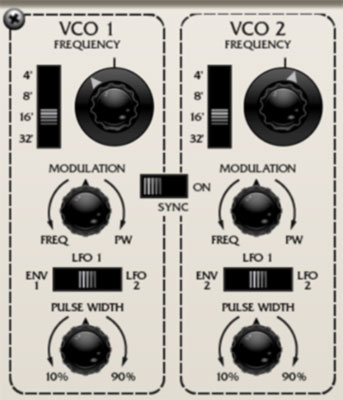
The voice modules each contain two almost identical voltage-controlled oscillators. The only difference are their modulation routing options.
Range- Sets the pitch range for each oscillator in octaves. These are at standard organ footage settings of 32', 16', 8', and 4'.
Frequency knob- This can be used to fatten up two oscillator patches by detuning a small amount, or for "building-in" a set interval. Its range is a smidge over a fifth, up or down.
Modulation amount knob and source switch- The mod amount knob is bidirectional; rotating it left from center position adds pitch modulation, rotating it right modulates pulse width of the pulse wave. Center position is off, i.e. no modulation.
The three-position slide switch selects the oscillator mod source from three sources:
Env 1 (VCO 1) / Env 2 (VCO 2)- Modulation source is envelope 1 or envelope 2. Selecting the envelopes as mod source doesn't "disconnect" them from the VCA or VCF.
LFO 1- The module's onboard LFO.
LFO 2- LFO 2 in the master section. LFO 2 is global to the entire instrument.
Pulse Width- Sets the width or "duty-cycle" of the pulse wave. It has no effect on the saw wave. This defaults to 50%, i.e., a perfect square wave. Moving the knob left or right narrows its width as well as the thickness of sound until it almost disappears at its extremes.
Sync- This causes VCO 1 to force reset the start of VCO 2's waveform to the beginning of its cycle, resulting in a wide range of harmonic tones from VCO 2. The range of tones can be varied by adjusting VCO 2's Frequency controls.
Choosing oscillator waveforms- One unusual aspect of the Oberheim SEM design is that the oscillators themselves contain no waveform controls. Instead, the level of saw and pulse waves is adjusted via mixer knobs at the bottom of the VCF section.